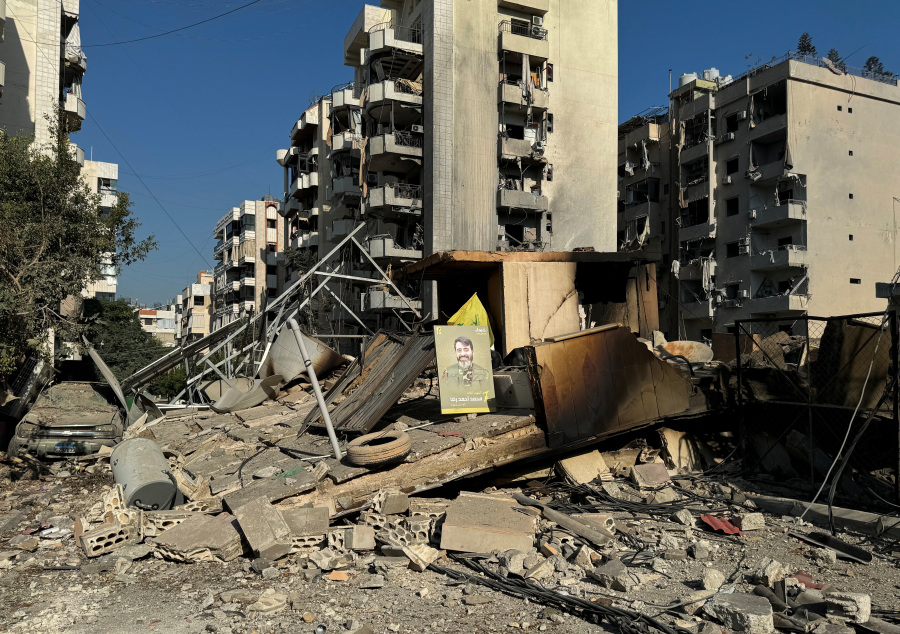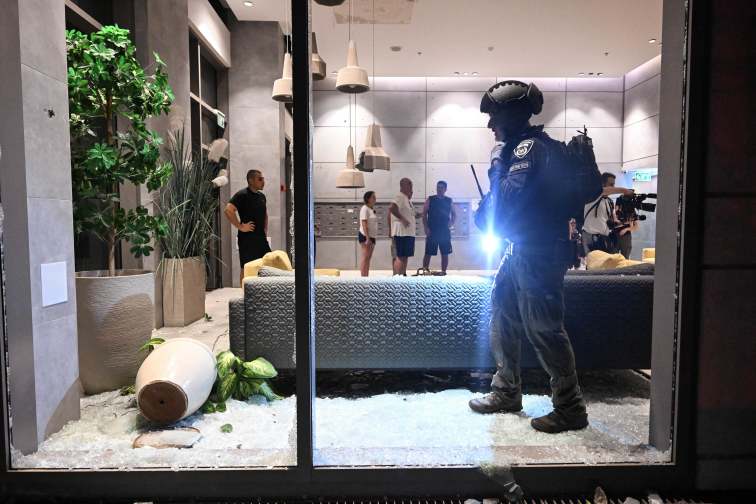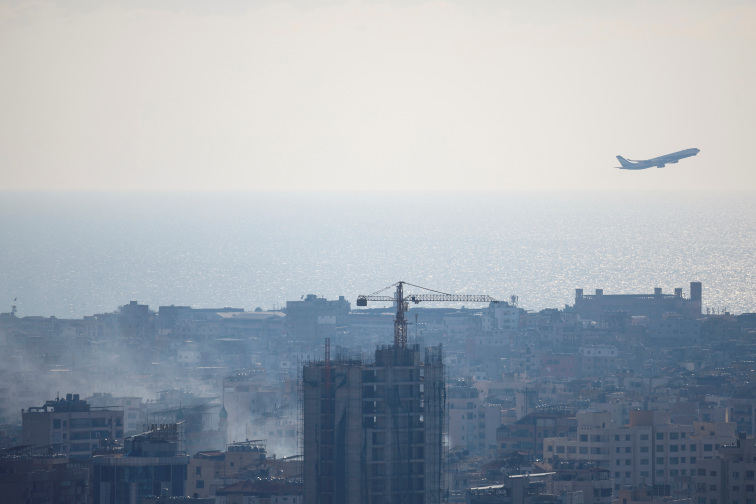A view shows a damaged site in the aftermath of Israeli strikes on Beirut's southern suburbs, amid the ongoing hostilities between Hezbollah and Israeli forces, Lebanon October 8, 2024.(REUTERS/Ahmad Al-Kerdi)
BEIRUT (Reuters) -Hezbollah's deputy leader said in comments broadcast on Tuesday that the group backs efforts to reach a ceasefire in Lebanon, and for the first time omitted any mention of a Gaza truce deal as a pre-condition to halting the group's attacks on Israel.
Naim Qassem's remarks were shown on television after Israeli forces began ground operations in the southwest of Lebanon, expanding incursions into a new zone.
Qassem said Hezbollah supported attempts by Speaker of Parliament Nabih Berri, a Hezbollah ally, to secure a halt to fighting, which has escalated in recent weeks with the Israeli ground incursions and the killing of top Hezbollah leaders.
"We support the political activity being led by Berri under the title of a ceasefire," Qassem said in a 30-minute televised address.
It was not clear whether this signalled any change in stance after a year in which it has said it is fighting in support of the Palestinians during the Israel-Hamas war in Gaza.
Qassem said Hezbollah would not be the first to yield in the war and that its capabilities were still intact. Israel has yet to advance after the ground clashes that broke out in south Lebanon a week ago, he said.
"In any case, after the issue of a ceasefire takes shape, and once diplomacy can achieve it, all of the other details can be discussed and decisions can be taken," Qassem said.
"If the enemy (Israel) continues its war, then the battlefield will decide."
The regional tensions triggered a year ago by Palestinian armed group Hamas's attack on southern Israel have spiralled to a series of Israeli operations by land and air over Lebanon and direct attacks by Iran onto Israeli military installations.
WARNING FROM IRAN
Iran warned Israel on Tuesday against any attacks on the Islamic Republic, a week after Tehran fired a barrage of missiles at Israel.
Any attack on Iran's infrastructure will be met with retaliation, Foreign Minister Abbas Araqchi said.
Araqchi will visit Saudi Arabia and other countries in the Middle East starting on Tuesday to discuss regional issues and work on stopping Israel's assaults on Gaza and Lebanon. Gulf Arab states have sought to reassure Tehran of their neutrality in the Iran-Israel conflict, sources told Reuters last week.
"Our dialogue continues in regards to the developments in the region to prevent the shameless crimes of the Zionist regime in Lebanon in continuation of the crimes in Gaza," Araqchi said in a video carried by state media.
"Starting today I'll start a trip to the region, to Riyadh and other capitals in the region and we will strive to have a collective movement from the countries of the region... to stop the brutal attacks in Lebanon."
ISRAEL PILES PRESSURE ON HEZBOLLAH
In Lebanon, Israeli forces piled more pressure on Hezbollah. The Israeli military said it was conducting "limited, localised, targeted operations" in Lebanon's southwest after announcing such operations for the southeast border area.
A World Food Programme official voiced concern about Lebanon's food supply, saying thousands of hectares of farmland across the country's south has burned or been abandoned.
"Agriculture-wise, food production-wise, (there is) extraordinary concern for Lebanon's ability to continue to feed itself," Matthew Hollingworth, WFP country director in Lebanon, told a Geneva press briefing, adding that harvests will not occur and produce is rotting in fields.
World Health Organization official Ian Clarke in Beirut told the same briefing that there was a much higher risk of disease outbreaks among Lebanon's displaced population.
Israel's military struck Beirut's southern suburbs overnight again and said it killed a senior Hezbollah figure responsible for the group's budgeting and logistics. If confirmed, the death of Suhail Hussein Husseini would be the latest in a string of Israeli assassinations of leaders and commanders of Hezbollah and its ally Hamas.
In the biggest blow to Hezbollah in decades, Israel killed its leader Hassan Nasrallah with an air strike in Beirut's southern suburbs late last month.
Many Israelis have regained confidence in their long-vaunted military and intelligence after deadly blows in recent weeks to the command structure of Hezbollah.
The situation in Lebanon is getting worse by the day, the European Union's foreign policy chief, Josep Borrell, told the European Parliament, calling for a ceasefire.
Some 20% of the Lebanese population had been forced to move, he said.
(Reporting by Elwely Elewelly in Dubai and Maya Gebeily in Beirut and Benoit Van Overstraeten in Brussels and Emma Farge in Geneva; Writing by Michael Georgy; Editing by Clarence Fernandez, William Maclean, Peter Graff and Timothy Heritage)











News magazine bootstrap themes!
I like this themes, fast loading and look profesional
Thank you Carlos!
You're welcome!
Please support me with give positive rating!
Yes Sure!